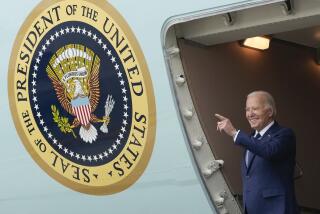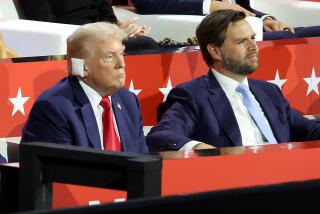‘Ideal Democrat’ to Vet Vice President Hopefuls
WASHINGTON — Jim Johnson’s first political activity was licking envelopes for Hubert Humphrey’s 1948 Senate campaign. He was 4 years old.
Now, 56 years later, after working with politicians from Edmund S. Muskie to Walter F. Mondale, after stints as head of Fannie Mae, the Kennedy Center and the Brookings Institution, Johnson has yet another role in politics as leader of Sen. John F. Kerry’s effort to select a running mate.
He has been there before. As campaign chairman for Mondale, the Democratic presidential nominee in 1984, Johnson oversaw a search process that resulted in the selection of Geraldine Ferraro, then a member of Congress from New York, as running mate. The nomination of the only woman ever selected for a major party ticket was a milestone in the country’s political history, but subsequent disclosure of her husband John Zaccaro’s financial dealings with alleged mob figures in New York shadowed the campaign.
Insiders still proud of the choice say they had only one day to research Ferraro’s background. This time, Johnson may have months to vet the candidates.
“He’s the consummate pro,” said Ken Duberstein, a consultant and former White House chief of staff for President Reagan, who defeated Mondale in a landslide. The two have since become friends. “He examines things from every angle. He is the ideal Democrat to vet Democrats. He is totally objective, not terribly sentimental, and he has an unbelievable Rolodex.”
Johnson’s Rolodex is famous in Washington. At Fannie Mae, the giant housing finance firm, it was the first thing a visitor noticed, and it fattened regularly as he had contact with nearly every congressional office on Capitol Hill.
At the Kennedy Center for the Performing Arts, one of the nation’s premier music and theater venues, Johnson’s contacts grew to include artists and musicians, directors and producers. And at Brookings, a Washington think tank, he added policy experts and academics.
He has long been a Democrat respected by Republicans. President Bush last year named him co-chairman of a commission to study the Postal Service and make recommendations for its future.
“Over the last 30 or so years, Jim Johnson has become a real institution in this town,” said Charles Cook, an independent political analyst. “He’s incredibly bright, and his knowledge of politics and the inner workings of this town is encyclopedic.” Besides, said Cook, “he knows where all the bodies are buried.”
Johnson has been on hand for pivotal and memorable moments of recent Democratic presidential history.
He represented Al Gore in 2000 in negotiations over the presidential debates that would prove the candidate a difficult sell. He sat with Mondale by the phone, waiting for Jimmy Carter to call in 1976 and offer him the vice presidential nomination.
And he was there, during preparations for the vice presidential debate in 1988, when Sen. Lloyd Bentsen of Texas crafted a line -- just in case Republican Sen. Dan Quayle of Indiana compared himself to John F. Kennedy -- that still resonates with aficionados: “Senator, I served with Jack Kennedy. I knew Jack Kennedy. Jack Kennedy was a friend of mine. Senator, you’re no Jack Kennedy.”
A wealthy man by any measure -- his annual compensation at Fannie Mae was as high as $6.2 million, according to the Wall Street Journal -- Johnson has continued to contribute to candidates and to follow politics avidly.
With his wife, Maxine Isaacs, who is affiliated with Harvard University’s John F. Kennedy School of Government, he recently held a fundraiser for Kerry. The two are friends, politically and socially.
“Jim is as good as anybody I can think of for this,” said Harold Ickes, a former Clinton deputy chief of staff who worked with Johnson on Eugene McCarthy’s 1968 presidential campaign. “Kerry and he are close. He is very careful. He knows a broad range of people.”
Conservative in his tastes, he rarely ventures beyond a white shirt and a Brooks Brothers tie. Committed to liberal causes, Johnson made lending to minority home buyers a priority at Fannie Mae. At the Kennedy Center, he and his wife contributed $1.5 million to launch the Millennium Stage, a venture that offers daily free concerts.
More to Read
Get the L.A. Times Politics newsletter
Deeply reported insights into legislation, politics and policy from Sacramento, Washington and beyond. In your inbox three times per week.
You may occasionally receive promotional content from the Los Angeles Times.










